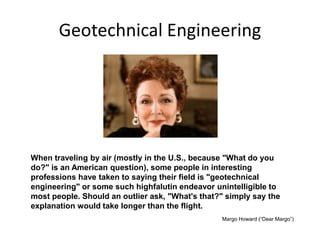Little Known Questions About Geotheta.
Geotheta Can Be Fun For Everyone
Table of Contents3 Easy Facts About Geotheta ShownExcitement About GeothetaThe Ultimate Guide To GeothetaThe Ultimate Guide To GeothetaGeotheta Things To Know Before You Get This

They carry out website examinations, gather examples, execute lab tests, and examine information to examine the viability of the ground for construction jobs - Tailings Engineer. Based upon their findings, geotechnical engineers give referrals for structure design, incline security, keeping frameworks, and mitigation of geotechnical threats. They team up with other specialists, such as engineers, architectural designers, and building and construction teams, to make certain that geotechnical considerations are incorporated into the total task design and application
By examining the behavior and homes of dirt and rock, they can determine potential geotechnical hazards such as landslides, soil settlement, or slope instability. Their experience helps avoid failures or crashes that can threaten lives and residential property. Right here are some thorough responsibilities and responsibilities of a geotechnical engineer: Site Investigation: Geotechnical designers conduct site examinations to gather information on subsurface conditions.
They analyze the information to understand the residential properties and actions of the dirt and rock, including their toughness, permeability, compaction characteristics, and groundwater problems. Geotechnical Analysis and Layout: Geotechnical designers assess the data collected during site examinations to evaluate the security and viability of the site for building tasks. They do geotechnical estimations and modeling to examine elements such as bearing ability, settlement, slope security, lateral earth stress, and groundwater flow.
The Buzz on Geotheta
Foundation Layout: Geotechnical designers play a crucial function in making structures that can safely sustain the intended framework. They examine the soil conditions and tons demands to establish the suitable foundation type, such as superficial foundations (e.g., grounds), deep structures (e.g (https://www.provenexpert.com/geotheta/)., heaps), or specialized strategies like dirt enhancement. They think about variables such as settlement limitations, birthing capability, and soil-structure communication to develop optimal foundation designs
They evaluate construction plans, monitor website activities, and carry out field assessments to validate that the design suggestions are followed. If unforeseen geotechnical concerns occur, they evaluate the scenario and offer suggestions for removal or adjustments to the layout. Threat Analysis and Mitigation: Geotechnical designers examine geotechnical threats and dangers related to the task website, such as landslides, liquefaction, or dirt erosion.

Collaboration and Communication: Geotechnical designers function closely with other specialists included in a project, such as engineers, structural engineers, and building teams. Efficient communication and cooperation are necessary to integrate geotechnical factors to consider right into the overall task style and building process. Geotechnical engineers supply technical know-how, solution queries, and make sure that geotechnical needs are met.
The Of Geotheta
Here are some types of geotechnical engineers: Foundation Designer: Foundation engineers focus on developing and assessing foundations for structures. They examine the dirt conditions, lots needs, and website characteristics to determine one of the most ideal foundation kind and style, such as shallow foundations, deep structures, or specialized techniques like pile foundations.
They review the factors affecting slope security, such as soil buildings, groundwater problems, and slope geometry, and establish methods to stop slope failings and minimize dangers. Quake Designer: Quake designers focus on evaluating and designing structures to endure seismic pressures. They examine the seismic risk of a site, evaluate soil liquefaction capacity, and create seismic design criteria to ensure the safety and security and durability of structures throughout quakes.
They carry out area testing, collect examples, and examine the gathered data to identify the soil residential properties, geologic formations, and groundwater problems at a site. Geotechnical Instrumentation Engineer: Geotechnical instrumentation engineers concentrate on tracking and measuring the habits of dirt, rock, and structures. They set up and preserve instrumentation systems that keep track of variables such as dirt settlement, groundwater degrees, slope motions, and architectural displacements to examine efficiency and provide very early warnings of prospective concerns.
The Geotheta Ideas
They carry out examinations such as triaxial examinations, debt consolidation examinations, direct shear tests, and permeability tests to collect information for geotechnical evaluation and style. Geosynthetics Designer: Geosynthetics designers concentrate on the layout and application of geosynthetic materials, such as geotextiles, geogrids, and geomembranes. They read this use these products to enhance soil stability, reinforce slopes, offer water drainage solutions, and control erosion.
They have a tendency to be investigatory individuals, which means they're intellectual, reflective, and inquisitive. They wonder, methodical, sensible, logical, and rational. Several of them are additionally social, meaning they're kind, charitable, participating, person, caring, useful, compassionate, tactful, and pleasant. Does this sound like you? Take our cost-free job examination to learn if geotechnical engineer is just one of your leading career suits.
In the workplace atmosphere, geotechnical engineers make use of specialized software program tools to execute computations, create designs, and examine information. They prepare reports, testimonial task specifications, connect with customers and group members, and coordinate project activities. The office setup gives a helpful atmosphere for study, evaluation, and collaboration with other professionals involved in the project.
Rumored Buzz on Geotheta
They regularly see project sites to conduct website investigations, evaluate geotechnical problems, and collect data for analysis. These check outs entail traveling to different locations, in some cases in remote or challenging terrains. Geotechnical engineers may perform soil tasting, conduct examinations, and display building tasks to ensure that the geotechnical aspects of the task are being applied appropriately.
Geotechnical designers additionally work in specialized geotechnical laboratories. Geotechnical research laboratory engineers function extensively in these settings, handling screening equipment, running instruments, and tape-recording information.